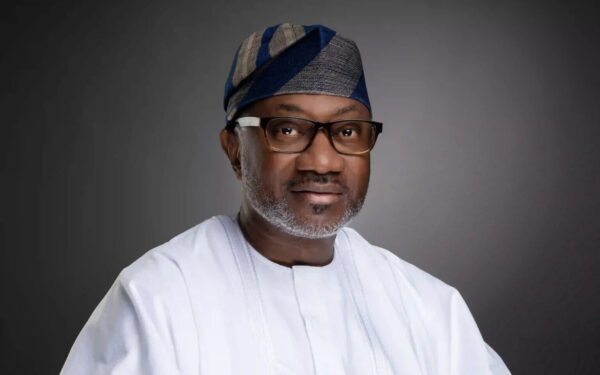In the Supreme Court of Nigeria
Holden at Abuja
On Friday, the 21st day of February, 2025
Before Their Lordships
Adamu Jauro
Moore Aseimo Abraham Adumein
Habeeb Adewale Olumuyiwa Abiru
Jamilu Yammama Tukur
Abubakar Sadiq Umar
Justices, Supreme Court
SC/190/2008
Between
MS MARY ESSIEN APPELLANT
And
1. SUSAN-OHIO INVESTMENTS LIMITED RESPONDENTS
2. HUBERT O. OGAR
3. NIGERIAN UNION OF TEACHERS
(CROSS RIVER STATE WING)
(Lead Judgement delivered by Honourable Habeeb Adewale Olumuyiwa Abiru, JSC)
Facts
The Appellant’s mother – Dr (Mrs) Margaret Essien commenced an action at the High Court of Cross River State against her husband – Obong Joseph Effiong Essien sometime in April 2002, seeking inter alia, a declaration that the building at No. 12 MCC Road, Calabar, covered by a Certificate of Occupancy registered as No. 35 at Page 35 in Volume 199 of the Land Registry Office in Calabar is the joint property of herself and Obong Joseph Effiong Essien. She also sought an order of injunction, restraining him from dealing with the property adversely against her interest. She claimed that the property was jointly built by her and Obong Essien.
In his defence, Obong Essien claimed that he is the sole owner of the house, and he solely funded the acquisition of the land and the construction of the property without any contribution from Dr (Mrs) Essien. He also claimed that he obtained a Certificate of Occupancy on the property in his name as the sole owner, and subsequently, sold the property to the 1st and 2nd Respondent in that capacity. In the course of the proceedings, the 1st and 2nd Respondent were joined as 2nd and 3rd Defendant. The 1st and 2nd Respondent filed their Statement of Defence and counter-claimed inter-alia, for a declaration that the assignment of the property to them was valid in law.
The 3rd Respondent was subsequently joined as the 4th Defendant, and in its Statement of Defence, it averred that the subject property had been sold to it by the 1st and 2nd Respondent. Thereafter, the matter proceeded to trial. During the pendency of the matter, Obong Essien commenced divorce proceedings against Dr (Mrs) Essien before another High Court in Calabar in Suit No. HC/8D/2002. Judgement was delivered in Suit No. HC/8D/2002, when the instant suit was at the point of adoption of final addresses. In the judgement, it was held that the property in dispute was the joint property of Obong Essien and Dr (Mrs) Essien. Thereafter, Counsel to Dr (Mrs) Essien filed an application, seeking to tender the judgement as additional evidence.
The trial court took the application, and the adoption of final address on the substantive suit together. The trial court prefaced its judgement with a ruling on the admissibility of the judgement in Suit No. HC/8D/2002, and held that the judgement was not pleaded and as such was inadmissible, but it would take judicial notice of the same being the judgement of a court of competent jurisdiction. In its judgement on the substantive suit, the trial court found that Dr (Mrs) Essien failed to prove her claim of joint ownership of the property, and that Obong Essien being the sole owner of the property had the power to sell the same without her consent. The Court also granted the counter-claim of the 1st and 2nd Respondent, save their prayer for an order compelling Dr (Mrs) Essien to pay mesne profits to them.
Aggrieved, Dr (Mrs) Essien appealed to the Court of Appeal. However, the Court of Appeal dismissed the appeal for being unmeritorious. Dr (Mrs) Essien thus, filed a further appeal at the Supreme Court. Dr (Mrs) Essien and Obong Essien died after the appeal was filed, and while Dr (Mrs) Essien was substituted with the present Appellant, the name of Obong Essien was struck out as a party in the appeal.
Issue for Determination
The Apex Court subsumed the issues formulated by the parties into the following sole issue:
Whether, on the state of the cases made out by the parties in their respective pleadings and evidence led thereon before the trial court, the lower Court was correct in affirming the findings and the conclusions reached by the trial court in dismissing the claims of the Appellant and granting the counter-claims of the Respondents.
Arguments
Counsel for the Appellant contended that the judgement in Suit No. HC/8D/2002 which declared the property in dispute as the joint property of Dr (Mrs) Essien and Obong Essien, constituted issue estoppel on the pending issue before the trial court of whether the property was the joint property of the two. Counsel argued that further deliberations by the trial court on the issue after the judgment in Suit No. HC/8D/2002 had been brought to its attention, was tantamount to the trial court indulging in abuse of court process and the Court of Appeal was wrong to have endorsed the trial court’s finding.
Counsel argued further that the lower court was also in error when it upheld the trial court’s decision, discountenancing the caveat filed by Dr (Mrs) Essien against the sale of the property at the Lands Registry, Calabar. Counsel submitted that having admitted the caveat in evidence despite the objection of Counsel for the Respondents, the trial court was wrong to have subsequently discountenanced it on the ground that it was inauthentic.
In response, Counsel for the 1st Respondent argued that the 1st Respondent had purchased the property in dispute from Obong Essien before the divorce proceedings in Suit No. HC/8D/2002 was commenced, and the law as pronounced in TALABI v ADESEYE (1973) 1 NMLR 8 is that the judgement obtained in the divorce proceedings cannot constitute issue estoppel against the 1st Respondent. Counsel submitted that since the 1st Respondent had acquired proprietary interest in the property upon purchase, it must be made a party in any suit touching on title to the property commenced thereafter, to enable it defend its proprietary interest and to be bound by the outcome of the action.
Counsel for the 2nd Respondent submitted that the production of the judgement in Suit No HC/8D/2002 before the trial court by Counsel for the Appellant was tantamount to leading evidence outside the pleadings, and the trial court was correct in treating the same as irrelevant. Counsel argued that the evidence led by Obong Essien on his sole ownership of the property in dispute outweighed the case made out by Dr (Mrs) Essien on joint ownership of the property, and this gave credence to the claims of the 1st and 2nd Respondent who derived title to the property from Obong Essien.
Respective Counsel for all Respondents submitted that the lower courts were correct in their concurrent findings against the Appellant.
Court’s Judgement and Rationale
The Apex Court held that a plea of estoppel, be it issue estoppel or per rem judicatam, must be mutually enforceable; thus, where privity of estate is set up as the foundation for its application, the title relied on to establish such privity must have arisen after the judgement on which the estoppel is based, or at least, after the commencement of the proceedings in the course of which judgement was given. The Court referred to the decision in OMIYALE v MACAULAY (2009) 7 NWLR (PT. 1141) 597. The Supreme Court held that in other words, a prior purchaser of land cannot be estopped as being privy in estate, by a judgement obtained in an action commenced against the vendor after the purchase. The Court placed further reliance on its decisions in TALABI v ADESEYE (1972) 8-9 SC 55 at 84 and AJEIGBE v ODEDINA (1988) 1 NWLR (PT. 72) 584.
The Court also referred to its decision in AKANDE v ALAGA (1988) 4 NWLR (PT. 86) in which it held that: “where a third party acquires an interest in property before the filing of a suit leading to the judgement pleaded as res judicata to defeat a subsequent action instituted by the third party, and the third party was not proved to be standing by at the time of the action, his claim cannot be defeated by the plea of res judicata. This is because the action leading to the judgement was instituted after he had acquired interest in the property, and he was not joined in the suit”.
The Apex Court held that it was not in contest that the Respondents acquired their respective titles to the property in dispute long before the divorce proceedings in Suit No. HC/8D/2002 was commenced, and before the issue of the joint ownership of the property was brought into the proceedings by Dr (Mrs) Margaret Essien in her cross- petition and much earlier than the date when judgement was entered in the action, and the Respondents were not made parties to the proceedings. The Court found that the divorce proceedings could not thus, operate to create an estoppel of whatever nature in the present proceedings; hence, the judgement was irrelevant to the present proceedings and it got the appropriate treatment it deserved from the two lower courts.
On the complaint of the Appellant’s Counsel on the refusal of the two lower courts to accord any probative value to the caveat alleged to have been filed by Dr (Mrs) Essien despite the trial court having admitted it as Exhibit 7, the Apex Court held that the fact that a piece of evidence is admitted does not translate to it being accorded weight or probative value by a trial court. The Court held that if a piece of documentary evidence is relevant, the court admits it once all other aspects of our adjectival laws are in favour of such admission; however the weight or probative value to be ascribed to it is based on factors such as relevance, credibility, probability and conclusiveness on the issues in respect of which it was put in evidence.
The Supreme Court held that in the present case, the caveat was admitted in evidence in the course of trial, however, in the course of its deliberations in the judgement, the trial court, in light of other facts and other pieces of evidence, found that the document was not credible and not conclusive enough to prove the fact it was put forward to establish, and consequently accorded it no weight or probative value. The Court found that the arguments canvassed by the Appellant on this point are the same arguments she canvassed before the Court of Appeal which the lower court considered and rejected, and the Appellant had not presented the Apex Court with any errors committed by the lower court in rejecting the arguments, to warrant the Apex Court’s interference.
The Supreme Court held further that an appellate court has no business dabbling into conclusions reached by a lower court in respect of which an appellant has not placed any contestation before it. The Apex Court found the Appellant having not appealed against the concurrent findings of the two lower courts that Dr (Mrs) Essien did not lead any credible and cogent evidence of her direct financial contribution to either the acquisition of the land or to the construction of the property in dispute, the Apex Court had no reason to interfere with the findings.
Appeal Dismissed.
Representation
O. J. Aboje with Emmanuel Ekong for the Appellant.
Dafe Diegbe for the 1st Respondent.
Chris Ohene with Ishaq Muhammed for the 2nd Respondent.
Efa O. Oka for the 3rd Respondent.
Reported by Optimum Publishers Limited, Publishers of the Nigerian Monthly Law Reports (NMLR)(An affiliate of Babalakin & Co.)
The post Whether Issue Estoppel Founded on Privity of Estate Applies to Prior Purchaser appeared first on THISDAYLIVE.



